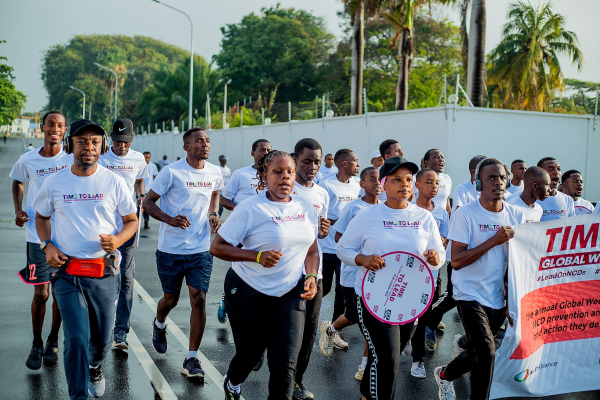PRESS RELEASE - 10 September 2025 (New York, US; Geneva, Switzerland)
With just two weeks to go until the fourth UN High-Level Meeting on NCDs and Mental Health (HLM4), civil society is urging governments to show leadership and step up investments to tackle the world’s leading health challenges. The NCD Alliance’s Time to Lead campaign urges countries to prioritise NCDs including mental health and neurological conditions, close the financing gap and deliver bold commitments at the HLM4 taking place on 25 September.
A new landmark report published by the NCD Alliance and authored by a team of researchers at the University of Washington provides clear investment targets to achieve global health and SDG goals. The report, “Delivering on Health and Financial Protection for All: Government Spending on Essential NCD Medicines and Services,” shows that countries are dangerously underspending on NCDs and outlines how much they must invest to get on track and save lives.
To achieve universal coverage and provide financial protection for NCD interventions, countries should aim to spend 1.1% to 1.7% of gross national income (GNI) on NCDs through their primary healthcare. Currently, most countries invest just 0.26% to 0.46% of GNI —highlighting decades of chronic underfunding.
The report looks at how much governments are spending on essential NCD medicines and services. The analysis offers compelling evidence to inform health budgets so that they better match health burdens and patient needs. Access to medicines is arguably the largest bottleneck to expanding access to NCD services and the key determinant of financial risk from NCDs due to out-of-pocket spending often required in LMICs. This creates a double-edged sword in many LMICs, in which low access to NCD medicines is coupled with high out-of-pockets costs.
The estimates in this paper are intended to provide a framework for governments on budget allocation and financial protection schemes for individuals living with NCDs, thereby contributing to the achievement of universal health coverage (UHC). A key finding is that a significant share of government spending on NCDs goes to medicines, and the report highlights opportunities to reduce these costs to stretch budgets further. The report shows the wide variation in medicine prices across countries, and models potential cost-savings of 20% to 50% if the best prices were available globally.
“Ministries of Health and Finance must act decisively on these findings,” said Dr David Watkins, lead author of the report. “This analysis provides governments with data to support smarter investment on NCDs, mental health, and neurological conditions in their policies and budgets. It’s not just about increasing investment but about making health budgets go further.”
The report findings underscore the urgency of commitments in the draft political declaration due to be agreed at HLM4.
New UN targets on NCDs welcomed, but civil society demands urgent action
The final draft of the Political Declaration on NCDs and Mental Health to be adopted at the fourth UN High-Level Meeting on NCDs and Mental Health (HLM4) on 25 September, acknowledges the urgency of the global NCD epidemic and sets targets for accelerated action. Yet the text falls short of on crucial commitments that require urgent action.
Targets on prevention, primary health care, financing, governance and surveillance are important elements of the final declaration, signalling commitment and providing the basis for measuring progress. However, the Political Declaration notably omits strong language on health-promoting fiscal policies such as taxes on tobacco, alcohol, and sugary-drinks, proven measures that save lives and raise revenue. This is the first time an NCD Political Declaration has recognised the role of people living with NCDs in the development of national plans. Civil society, meanwhile, is mentioned only once.
The NCD Alliance is calling on governments to turn these global pledges into funded national policies that deliver measurable results for people living with NCDs and mental health conditions. While the draft includes important steps forward, civil society is concerned by the dilution of earlier ambition, including the removal of strong commitments on health taxes, and the use of weaker language on prevention measures.
"This is a critical moment. People living with NCDs around the world are speaking with one voice: we know what works—and so do governments," said Nupur Lalvani, member of the Our Views, Our Voices Global Advisory Committee. "Millions of lives are on the line. We need leadership, funding, and accountability now. The world is watching."
The Time to Lead campaign, part of the Global Week for Action on NCDs (18–25 September), aims to elevate civil society voices in the lead-up to HLM4, demanding that governments move beyond words to meaningful action.
Further information
Michael Kessler
NCD Alliance Media Relations
Mob: +34 655 792 699
Email: michael.kessler@intoon-media.com
About the NCD Alliance
The NCD Alliance is a registered non-governmental organisation (NGO) based in Geneva, Switzerland, dedicated to supporting a world free from preventable suffering, disability and death caused by NCDs. Founded in 2009, NCDA brings together a unique network of over 500 members in more than 100 countries into a respected, united and credible global civil society movement. The movement is unified by the cross-cutting nature of common risk factors including unhealthy diets, alcohol, tobacco, air pollution and physical inactivity, and the system solutions for chronic NCDs such as cancer, cardiovascular disease, chronic lung disease, diabetes, mental health and neurological disorders.




